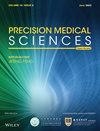Xiaotan Sanjie Fang prevents colonic inflammation‐related tumorigenesis by inhibiting COX ‐2/VEGF expression cancer
IF 0.6
Q4 MEDICINE, RESEARCH & EXPERIMENTAL
引用次数: 0
Abstract
Abstract Colitis‐associated bowel cancer (CAC) is one of the most common malignancies associated with inflammation. The aim of this study was to observe a new herbal formula “Xiaotan Sanjie Fang” (XTSJF) derived from the addition and subtraction theory of traditional medicine as an alternative to CAC treatment by “Daotan Decoction” and “Xiaojianzhong Decoction”, which are famous traditional Chinese medicine prescriptions for the treatment of inflammatory diseases of the digestive tract. We constructed a DMH/DSS inflammation‐associated colorectal cancer rat model and treated CAC rats with sulfasalazine and different doses of XTSJF. The results showed that the body weight of rats treated with different doses of XTSJF increased, which was still lower than that of normal rats; AFC decreased significantly compared with the model group and the positive control group, and the final dose was superior to the low dose; histological observation revealed that it could maintain the normal structure of colon tissue, while it could inhibit the secretion of VEGF, COX2, and AQP1 and the expression of pro‐inflammatory cytokines IL‐6, IL‐1β, and TNF‐α, promote the expression of caspase‐3 and BAX and inhibit the expression of Bcl‐2. Taken together, these data suggest that XTSJF can inhibit COX‐2/VEGF expression to prevent the development of inflammation‐associated colorectal cancer.消痰散结方通过抑制COX‐2/VEGF的表达来预防结肠炎症相关肿瘤的发生
结肠炎相关肠癌(CAC)是最常见的与炎症相关的恶性肿瘤之一。本研究的目的是观察从传统医学加减法理论中衍生出的一种新的中药方剂“消痰散结方”(XTSJF)作为治疗消化道炎症性疾病的著名中药方剂“导痰汤”和“消炎中汤”治疗CAC的替代方剂。我们建立DMH/DSS炎症相关的结直肠癌大鼠模型,用磺胺氮嗪和不同剂量的XTSJF治疗CAC大鼠。结果表明:不同剂量XTSJF处理后大鼠体重均有所增加,但仍低于正常大鼠;AFC较模型组和阳性对照组显著降低,终剂量优于低剂量;组织学观察显示,它能维持结肠组织的正常结构,抑制VEGF、COX2、AQP1的分泌和促炎因子IL - 6、IL - 1β、TNF - α的表达,促进caspase - 3、BAX的表达,抑制Bcl - 2的表达。综上所述,这些数据表明XTSJF可以抑制COX‐2/VEGF的表达,从而预防炎症相关结直肠癌的发生。
本文章由计算机程序翻译,如有差异,请以英文原文为准。
求助全文
约1分钟内获得全文
求助全文

 求助内容:
求助内容: 应助结果提醒方式:
应助结果提醒方式:


